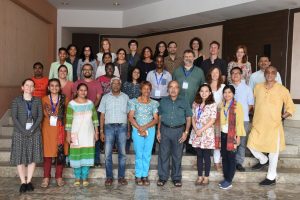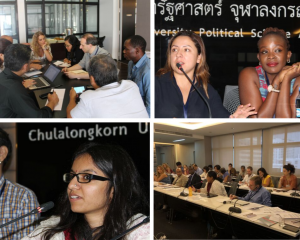Data and the Digital Economy
Our policy research and advocacy efforts in relation to the digital economy have focused on identifying appropriate directions for the governance of platforms, data and AI technologies, from the standpoint of equity and social justice. In global and national policy dialogues, we have consistently articulated the rights of marginalized people and groups in the rapidly platformizing and datafying economy, underscoring the linkages between data justice and the right to development.
Overview
Data extractivism – data being unilaterally collected and appropriated by a few transnational platform companies – has emerged as the central contention in the digital economy. Yet, global and national debates on data governance continue to almost exclusively be oriented towards concerns of privacy and personal data protection. There is some fledgling work on addressing bias and social discrimination in data and AI systems. However, the policy debate on the economic rights of individuals and communities to their data resources, including an equitable share in the value generated from such data, is rather underdeveloped.
This is an urgent issue to be addressed when digital platform business models are beginning to dominate all sectors of the economy, transforming core economic activities through data-based intelligence. Against this backdrop of pervasive platformization and datafication, IT for Change’s research and policy advocacy has focused on charting new directions for equitable and socially-just platform and data governance.
Research
Policy frameworks for digital platforms-Moving from openness to inclusion

We continued our multi-country research project, Policy frameworks for digital platforms – into the second year. This project supported by the International Development Research Centre IDRC, Canada, seeks to address head-on the complexities of social exclusion and development injustice in the platformizing and datafying economy. As leading development scholars and international institutions such as the United Nations Conference on Trade and Development (UNCTAD) have pointed out, the ‘Amazonification’ of the entire economy is not opening up new opportunities for smaller players, as is often touted. Instead, there seems to be a consolidation of monopolistic tendencies, a decline in the labor share of value, and an intensification of inter and intra-country inequality. Through empirical investigations of platform ecosystems in different country-contexts in Asia, Africa, Europe, North America and Latin America, and legal-conceptual explorations of institutional and techno-design models for platform and data governance, this project has attempted to demonstrate pathways towards forging an equitable and inclusive platform economy.
This year, under IT for Change’s conceptual leadership, the network of researchers in the project produced 12 legal reviews and case studies that unpacked the operations of power hierarchies in platformization across different sectors such as ride-hailing, food delivery, tourism, retail commerce, agriculture and so on. A series of five think-pieces, Platform Politick, was also produced as part of the project. The unique contribution of the project to the larger digital policy debate has been its foregrounding of a South-centred development perspective that has usually been neglected in mainstream scholarship in this domain.
An important project milestone was the Project Review Meeting convened in June 2018. Co-hosted by the Centre for Policy Studies, IIT-Bombay in partnership with IT for Change, this two-day meeting convened in Mumbai provided an opportunity for network members to share insights from ongoing research with one another, discuss the ways in which impacts could be widened and strategize about the future of the network. The peer feedback received during this meeting was incorporated by many members when finalizing their outputs. An end of project national workshop to disseminate the results of the project and connect to debates in India is planned as a capstone to this project.
Advocacy
Introducing the concept of community data in national policy debates
In most mainstream data governance debates, the way this problem has been dealt with is to argue how individuals should receive monetary compensation for their personal data. But this is both an impractical and unsatisfactory solution. As is well-acknowledged, the value is not in the individual data points, but in the intelligence extracted from the aggregate data sets and its deployment. The real question, therefore, is how to ensure, for instance that an online marketplace that uses sellers’ aggregate data works in the later’s interest, or how a taxi-aggregator platform uses the intelligence it generates for the benefit of its drivers. This is where IT for Change has been successful in making a pioneering and pivotal contribution to the discourse, by introducing the concept of community data.
Community data refers to the aggregate, de-identified personal data generated from a geographical or an interest-based community (or natural phenomenon and artifacts generally associated with a community). It also acts as a proxy for a collective approach to people’s personal data for its protection and benefit maximization. Our submission is that such data has to be treated as a common property resource or a collective asset of the community and governed as such. The current laissez-faire regime of unrestricted cross-border data flows of community data enables its enclosure and expropriation by a few powerful transnational digital corporations of the US and China.
We introduced this concept in two critical Indian policy documents in 2018-19. The first is the Justice Srikrishna Committee Report on data protection. In consultations in Bengaluru, we made a submission on why the concept of community data must be acknowledged in the Committee’s report, though it was primarily focusing on personal data. In its report, the Committee included a section on community data, observing that while the proposed personal data protection bill will not address this issue, the government must bring out a separate legislation on community data.
The second is the draft e-commerce policy developed by the Ministry of Commerce and industry think-tank set up for this. IT for Change was the only civil society member in this think-tank and we were successful in introducing the concept of community data and ideas about data localization for benefiting medium, small and micro enterprises as part of facilitating an equitable digital industrialization process. The draft e-commerce policy has been recognized as a pioneering data policy-related document the world over.
Over the year, we have had extensive engagements with civil society groups and movements, as well as the industry, in India, on why economic rights in data should matter to them. We spoke on these issues at all-India level apex coordination meetings of labor unions as well as of farmers’ groups and traders’ groups. We took a very active role in informing, activating and organizing traders’ groups on why data ownership sections of the draft e-commerce policy are key to the protection of their interests. Our efforts have contributed to a considerable shift in the perception among these movements and groups on data policies not being an elitist or esoteric subject, but pertaining closely to their livelihood rights.
Introducing the idea in the UNCTAD Digital Economy 2019 Report
At the global level, we were successful in influencing the UNCTAD, especially the group of experts involved in developing the 2019 edition of its flagship Digital Economy Report, on ideas of community data and collective ownership. We were commissioned to do a background paper on data issues for the Report and were invited to attend two face-to-face expert meetings for developing it, where we were among the very few Southern participants. Our success is evident from the final report, which was released recently, and speaks about collective approaches to data, defines community data, and asserts how data ownership can become meaningless in a global regime of unrestricted cross-border data flows. The report also accepts our proposition and concept of digital intelligence being a preferred social term over the technical term, Artificial Intelligence, and uses it throughout the report. This is a term that we first coined in the background paper, Developing Countries and Digital Industrialization that we developed for the Commonwealth Secretariat.
Parminder Jeet Singh was invited to address UNCTAD’s Inter-governmental Group of Experts on E-commerce and the Digital Economy, on the issue of data ownership, in April, 2019. This presentation resonated very well with developing country delegates and many of them interacted with us in order to understand more. Some delegates had earlier supported the liberalization of data flows in trade policy dialogues, and the presentation and subsequent interactions helped them appreciate the importance of protecting community data as a strategic economic resource. We also circulated two documents on Data Localization is a Matter of Rule of Law and Economic Development and Why Owning their National Data is Important for Developing Countries, which were very well-received. Some senior government officials, especially from the African region, have sought to keep in touch with us in order to evolve their country’s stances on data policies.
Bringing a global South perspective to digital trade policy debates
As in previous years, IT for Change participated in periodic meetings at the South Centre, Geneva, with developing country trade negotiators to inform their positions on e-commerce and data issues in trade policy forums. The main thrust of our strategic input has been on how developing countries should not relinquish their policy space to govern data flows in trade policy negotiations by acquiescing to the demands of the US. We have argued how the space for data localization, often dismissed in the trade policy mainstream as trade-distorting protectionism, is essential to the preservation of strategic economic interests and the right to development of the global South. Tracking how countries’ stances have changed over the year reveals that our inputs have been influential.
We have kept up our engagements with developing countries beyond India, especially in the African region. In May 2018, we provided expert input on human rights, development and gender justice issues pertaining to digital trade to a conference organized by the UN Economic Commission for Africa, Office of the High Commissioner of Human Rights, and Friedrich Ebert Stiftung (FES) in Addis Ababa on evolving a digital trade strategy for the African region.
We attended the Africa e-commerce week in Nairobi in December 2018. Over multiple meetings, we interacted with government officials, officials from the UN Economic Commission for Africa and African civil society, alerting them to the risks of premature e-commerce liberalization before building a robust domestic digital industry. We also engaged in talks with senior officials from Rwanda and Nigeria on e-commerce and data issues.
We were invited in November 2018, by a think-tank affiliated with South Africa Ministry of trade and industry on the recommendation of the concerned minister, to discuss issues about digital industrialization in South Africa. We were also able to interact with the minister in this regard, who, in his inaugural speech, quoted from our report on digital industrialization undertaken for the Commonwealth Secretariat.
We held many meetings with Indian digital industry groups on the threat of global digital corporations to India and to their businesses, and how the proposed data rules in global and plurilateral trade policy negotiations could hamper their interests. These interactions were very helpful in developing our perspectives and positions in trade policy forums on the data policy directions that developing countries need for safeguarding local industry. Considering that many of these Indian industry players were also involved in the formation of the draft national e-commerce policy, this engagement was doubly useful. We are also leading the Confederation of India Industry (CII)’s core group on data localization. We developed a report on this subject, which is now under CII’s consideration to be forwarded to the government. We are also associated with helping the Federation of Indian Chamber of Commerce and Industry (FICCI) develop its positions on data policies . We were part of a group set up by the Ministry of Micro, Small and Medium Enterprises for exploring the relevance and benefits of e-commerce to these enterprises.
At the regional level, we attended the 24th and 25th rounds of stakeholder consultations of Regional Comprehensive Economic Partnership negotiations in Bangkok (July 2018) and Bali (February 2019) respectively, working with civil society coalitions in the Asia-Pacific to table critical concerns about e-commerce and data rules being proposed in the agreement.
Strategy Workshop of the Just Net Coalition

In October 2018, we organized a panel on Policies for an equitable platform economy at the WTO Public Forum in Geneva, bringing in perspectives from our research on platform governance and insights from our digital trade advocacy. Parminder Jeet Singh and Anita Gurumurthy represented IT for Change on the panel.
In February 2019, Parminder Jeet Singh spoke at the Technical Seminar on Global Regulation of Digital Labour: Opportunities and Challenges organized by International Labour Organisation (ILO).
In November 2018, Parminder Jeet Singh spoke about education in a digital age at a panel organized by NCERT, New Delhi.
In February 2019, Jai Vipra represented IT for Change at the stakeholder consultation during the 25th round of negotiations for the Regional Comprehensive Economic Partnership and presented an input on protecting people’s economic rights in data.

Parminder Jeet Singh at New York University School of Law, April 2019 In April 2019, Parminder Jeet Singh was invited by New York University School of Law for a symposium of Global Data Law, where he presented work on community data in India.
In April 2019, Anita Gurumurthy was invited for an expert lecture on data governance and development by the faculty of Azim Premji University, Bengaluru.
Impact
Our research project on platform governance has helped in generating a Southern perspective on the governance of the digital economy, filling a much-needed vacuum. The conceptual terms of community data and digital intelligence that we came up with have obtained a significant place in digital policy debates at global and national levels. We have become the go-to organization for progressive trade justice networks such as OWINFS and the Forum Against FTAs in evolving their positions on digital justice. Policymakers in India and in developing countries, and international organizations, pay heed to our positions in e-commerce negotiations.
Plan for 2019-20
We will wrap up our platform governance research, collating and bringing together insights into a synthesis report. To systematize our conceptual contribution on data, we are starting a dedicated line of research on data governance with support from the Data Governance Network of the IDFC Institute. We will continue our advocacy around collective economic rights in data at national and global levels, including digital trade policy debates. We will also take forward the work of the Just Net Coalition on evolving the digital justice manifesto, and are planning to convene a second strategy meeting of the network on the sidelines of the Internet Governance Forum in Berlin 2019.
Recognizing that the governance of AI technologies is the next frontier of these debates, with support from FES-India, we will work on a set of think-pieces scoping the outlook for AI in the global South – moving beyond a purely liberal framing of human rights in AI governance to an expansive reflection on the interrelated impacts of AI on civic-political rights, socio-economic rights and the right to development. These papers, scheduled for release in 2019, will be part of FES’ larger research series on AI in India.
